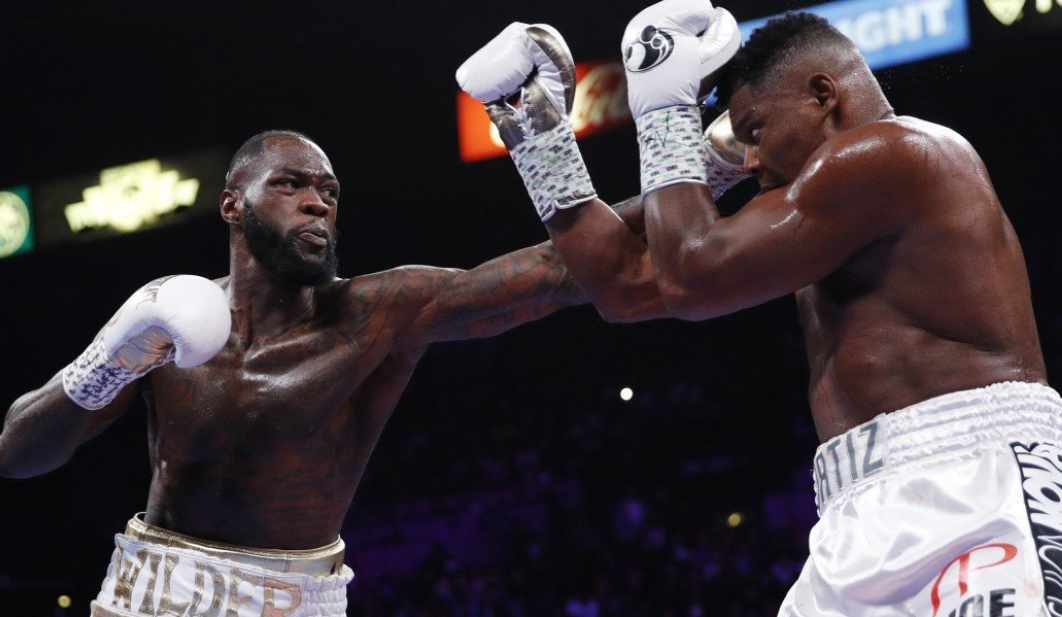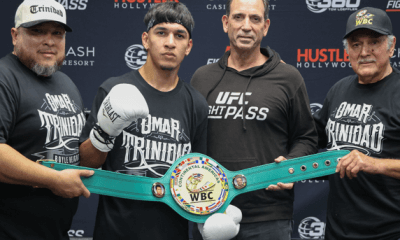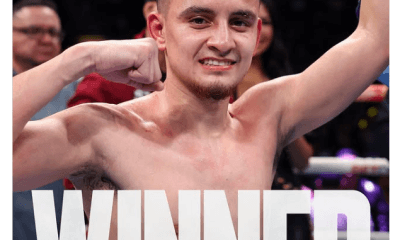Featured Articles
Deontay Wilder May Be a One-Trick Pony, But What an Extraordinary Trick It Is

Deontay Wilder May Be a One-Trick Pony, But What an Extraordinary Trick It Is
Scientists with instruments precise enough to gauge such matters tell us that the return stroke of a lightning bolt (the current that causes the visible flash) moves upward at a speed of about 220 million miles per hour, or one-third the speed of light.
Reason also tells us that WBC heavyweight champion Deontay “The Bronze Bomber” Wilder’s vaunted overhand right can’t possibly move that swiftly, but its effect is no less destructive when it lands flush. Down on all three official scorecards through six rounds Saturday night at Las Vegas’ MGM Grand and seemingly in no particular hurry to do what he almost always does in the ring, Wilder finally flashed his signature lightning bolt in the closing seconds of the seventh. Thudding against Ortiz’s forehead with a concussive force only occasionally glimpsed in big-man boxing, it so electrified the dangerous Cuban southpaw that he collapsed onto his back, the whites of his eyes rolling in his head. His groggy attempt to pull himself upright before referee Kenny Bayless reached the count of 10 failed.
It went into the books as a knockout after an elapsed time of 2 minutes, 51 seconds, boosting Wilder’s professional record to 42-0-1 with 41 KOs, but no matter. The remaining nine seconds in the round, and the subsequent one-minute rest period, almost surely would not have been enough to sufficiently restore the shaken challenger’s equilibrium or to enable him to avoid that lethal weapon of a right hand for five more rounds.
It was not exactly a replay of their first meeting, on March 3, 2018, in Brooklyn’s Barclays Center, when Ortiz (now 31-2, 26 KOs, 2 NC) had Wilder in trouble in the seventh round before going down and out himself in round 10. The put-away shot in that clash was a demonstration of the champ’s versatility, such as it is, with a ripping right uppercut nearly separating Ortiz’s large head from his broad shoulders.
“I was clear-headed when I hit the canvas,” Ortiz said, despite evidence to the contrary. “When I heard the referee say `seven’ I was trying to get up. But I guess the count went a little quicker than I thought.”
But there was nothing amiss with Bayless’ sense of timing, just as there was nothing wrong with the surprising patience exhibited by Wilder before capitalizing on the opening he knew would come. He didn’t take up boxing until the relative advanced age of 19, logging just 40 or so amateur bouts (Ortiz had nearly 400), including his bronze medal turn at the 2008 Beijing Olympics, before turning pro on Nov. 15, 2008, with, natch, a second-round stoppage of Ethan Cox.
The lightning bolts have continued to crackle with metronome regularity, the only two times Wilder, now 34, has been obliged to go the distance being his title-winning unanimous decision over Bermane Stiverne on Jan. 17, 2015, and a rousing split draw with lineal titlist Tyson Fury on Dec. 1, 2018. It should be noted, however, that Wilder floored Bermane three times en route to a first-round stoppage in the do-over on Nov. 4, 2017, and had Fury down twice, including a knockdown in round 12 that was almost identical to the way he put away Ortiz in Vegas. The only difference is that Fury lurched to his feet and gathered himself enough to fight back and make it to the final bell.
Throughout much of Wilder’s pro career he has fought as if his hair were on fire, wanting to get his man out of there as soon and as savagely as possible. For his second go at Ortiz, he was unaccustomedly restrained, landing just three of 31 punches in the first round and five of 31 in the second, according to statistics compiled by CompuBox. For the night, he was on target with just 34 of 184, a tepid 18.5%, with the 40-year-old Ortiz no busier, landing 35 of 179 (19.6%). The pace was almost glacial compared to the undercard bout in which WBA super bantamweight champion Brandon Figueroa and Julio Ceja, who fought to a split draw, combined to connect with an astounding 784 of 2,811 through 12 action-packed stanzas. Figueroa thus retained his title, which would have become vacant had he lost to Ceja, who came in four pounds over the 122-pound limit.
But they say all good things come to those who wait, and Wilder, co-trained by Mark Breland and Jay Deas, appears to have finally learned there are benefits that can be gained by waiting to pick your spots before unfurling that dynamite right hand.
“You know, my intellect is very high in the ring, even though I don’t get no credit for it,” said Wilder, seemingly nonplussed by the scorecards that had him trailing 59-55 on those submitted by Dave Moretti and Steve Weisfeld and 58-56 on Eric Cheek’s. “But, you know, I had to go in and I had to go out. I had to throw the right hand a few times and I finally got my measurement, and I took the shot. I seen the shot and I took it. I think I hurt him one time, buzzed him a little bit with the left hook. That was the start of it, and then I took my (cue) from there.”
Maybe it now is time to assess how Wilder’s punching power stacks up against the hardest-hitting heavyweights ever. By defending his WBC title for the 10th time and whacking out Ortiz again, his kayo percentage rose a bit to 95.3%, tops among anyone who has ever held a world championship in the sport’s most prestigious division, topping the 88% mark registered by the late, great Rocky Marciano (49-0, 43 KOs). It can be argued, of course, that any such number is somewhat subjective, dependent upon the quality of opposition faced. It is becoming increasingly difficult, however, to dismiss the Tuscaloosa, Ala., native – still absent from many astute observers’ top 10 pound-for-pound lists – as a one-trick pony whose right hand is the only weapon in his arsenal. He still uses his jab mostly as a range-finder, but the word going into the second Ortiz fight was that he had been working to make his left hook something more than ornamental, which seems to have been the case. It’s not at the Joe Frazier level yet, but if it ever gets there, watch out.
Lou DiBella, who was involved in the staging of several of Wilder’s earlier defenses, disputed the notion that Wilder is still as raw and unrefined as he was when he dethroned Stiverne.
“I don’t work with the dude anymore, but the `Wilder has no talent’ narrative is trash,’” DiBella tweeted. “The ability to destroy an `A’ level opponent with a single punch at any SECOND of a fight is a singular, awesome TALENT. Give @BronzeBomber the credit he deserves. He is a scary man.”
Next up for Wilder is the contracted rematch with Fury (29-0-1, 20 KOs) on Feb. 22, should Fury prove he is recovered enough from the nasty gash above the right eye he suffered in his Sept. 14 unanimous-decision victory over Sweden’s tougher-than-expected Otto Wallin to proceed on that date. If Wilder’s history in rematches with Stiverne and now Ortiz is any indication, an exclamation-point finish against the “Gypsy King” no doubt would further certify the Alabaman as a big enough hitter to be part of the conversation when rating the power quotient of such legendary heavyweights as Marciano, Sonny Liston, Joe Louis, George Foreman, Jack Dempsey, Earnie Shavers, Vitali Klitschko and Mike Tyson, who was in attendance Saturday night and looking his age at 53 with a beard gone gray and a bit of middle-age paunch.
But what Wilder really wants is to have what the most recent undisputed heavyweight champion, Lennox Lewis, had, which is to scoop up all the alphabet titles, eliminating any doubt as to his claim to be the biggest, baddest and best heavyweight of his generation. The other three most widely recognized belts (WBA, IBF and WBO) are currently held by the rotund but quick-handed Andy Ruiz Jr. (33-1, 22 KOs), who defends them in a rematch with Anthony Joshua (22-1, 21 KOs) on Dec. 7 in Diriyah, Saudi Arabia. The outcome of that matchup remains to be determined, as is the likelihood of a full unification pairing of the winner and Wilder. Just as there were promotional and television obstacles in the recent past, when HBO and Showtime were highly reluctant to make bouts involving fighters from the other side of the street, the fact that Wilder is with Premier Boxing Champions, Fury with Top Rank, Ruiz with PBC and Joshua with Matchroom Boxing and DAZN could prove problematical. The sad fact is that Riddick Bowe never swapped punches with Tyson, who also rose up from the Brownsville section of Brooklyn, or Lewis, who had defeated him in the gold medal bout at the 1988 Seoul Olympics. Sometimes the most contentious battles are waged not inside the ropes, but in paneled boardrooms where the cutthroat business of boxing is conducted.
“I am the best in the world and I say it with confidence,” Wilder said prior to the Ortiz rematch. He repeatedly has stressed that he wants fight fans to think of one man, one name, one face, when it comes to global recognition as the true heavyweight champion.
Time will tell if his quest is fulfilled.
Check out more boxing news on video at The Boxing Channel
To comment on this story in The Fight Forum CLICK HERE
-

 Featured Articles3 weeks ago
Featured Articles3 weeks agoThe Hauser Report: Zayas-Garcia, Pacquiao, Usyk, and the NYSAC
-

 Featured Articles2 weeks ago
Featured Articles2 weeks agoOscar Duarte and Regis Prograis Prevail on an Action-Packed Fight Card in Chicago
-

 Featured Articles1 week ago
Featured Articles1 week agoThe Hauser Report: Cinematic and Literary Notes
-

 Book Review4 days ago
Book Review4 days agoMark Kriegel’s New Book About Mike Tyson is a Must-Read
-

 Featured Articles4 weeks ago
Featured Articles4 weeks agoManny Pacquiao and Mario Barrios Fight to a Draw; Fundora stops Tim Tszyu
-

 Featured Articles4 weeks ago
Featured Articles4 weeks agoArne’s Almanac: Pacquiao-Barrios Redux
-

 Featured Articles3 weeks ago
Featured Articles3 weeks agoRemembering Dwight Muhammad Qawi (1953-2025) and his Triumphant Return to Prison
-

 Featured Articles4 weeks ago
Featured Articles4 weeks agoOleksandr Usyk Continues to Amaze; KOs Daniel Dubois in 5 One-Sided Rounds


















